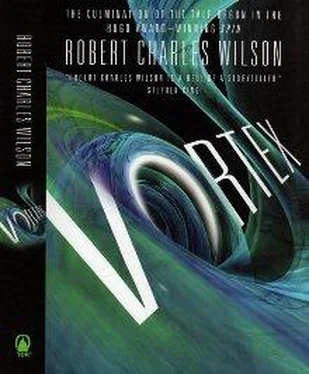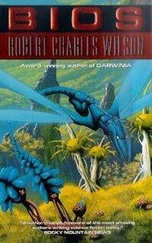We stepped into the vehicle as the interior lights winked on. I quickly checked to see that the aircraft had its full complement of supplies, including food and water to last us through the Arch to Equatoria. The stasis lockers were stocked and complete. There were no warning lights or sounds, which meant we were good to go. Turk took a seat in the forward compartment of the aircraft. It was possible to fly the vehicle from any of its control surfaces, and you didn’t need visuals to know where you were going. But Turk had been a pilot in his past life, flying by eye and hand. The first thing he did after he established an interface was to create a window display in the front wall, as if he were sitting in an old-fashioned cockpit. Suddenly I could see the wide expanse of the hangar deck in front of us—it made me feel defenseless; I would have preferred a blank wall.
But if it helped Turk, so be it. I took a seat beside him and watched the deck for any sign that we’d been noticed. Which came immediately. Yellow lights blinked on over the transit pods. Company was coming. I was surprised it hadn’t come sooner, but that might have been Isaac running interference for us. “We have to leave,” I said, “now.” The ship’s controls couldn’t be overridden from outside the vehicle… at least I didn’t think so; but if a second vehicle came after us we could theoretically be intercepted or shot down.
The aircraft didn’t move. “Having a hard time keeping the menu in front of me,” Turk whispered, visualizing a display I couldn’t see. Sweat beaded on his forehead.
“It’s just like the training interfaces. All we need is to go up. ”
Outside, the nearest transit pod slid open and disgorged a company of soldiers.
“Now, Turk. Or else we stay.”
He gave me a helpless look.
I said, “I don’t want to die here.”
He nodded. He closed his eyes and swallowed hard. Abruptly, the deck fell away beneath us.
Our aircraft pushed through the electrostatic barrier into murky daylight.
Suddenly Vox was a dark patch on the surface of the Ross Sea far below us, the scuttled islands of the Farmers surrounding it like a sunken reef. We rose at a vertiginous speed until the sea was lost in mist, rose until we soared above a deck of clouds that ran to every horizon.
Turk confirmed our destination with the aircraft’s onboard protocols and managed to lock out any signals coming from Vox. Which also isolated his node from the activity of the Coryphaeus—he shuddered once, then shook his head as if to clear it. He instructed the vehicle to alert us in the event of pursuit (there was none, probably thanks to Isaac) and sat back, drained and pale, from the control surfaces. The clouds below us looked as forbidding as a range of wild mountains.
He looked at me with his eyes narrowed. I remembered that feeling—the way Treya had felt when the Network shut down, as if all the color and sense had been drained from the world. “Promise me something,” he said.
“What?”
“The thing they attached to my spine—once we get where we’re going, promise you’ll cut it out of me.”
Solemnly, I promised I would.
* * *
Once we get where we’re going. We hadn’t been able to talk much about that.
Back at Vox Core I had spent a lot of time viewing material from the Voxish archives (using only manual interfaces, a slow and frustrating process) and reading the histories that had been prepared for Turk. Vox had been persecuted for centuries by jealous cortical democracies, or so I had been taught. But without the cheerleading of the Coryphaeus, those familiar stories seemed ambiguous and even disturbing. The founders of Vox had been the activist wing of a radical belief system, ostracized by the bionormative majorities of the Middle Worlds for their experiments with banned Hypothetical biotechnology. In response the founders had chosen to create their own closed polity, a limbic democracy with a built-in metaphysics.
Vox must have seemed, at least at first, just a slightly more eccentric example of the many artificial island communities that grew and thrived in the oceans of Ester, a watery Middle World. The founders had abandoned experiments with Hypothetical biotech in favor of their belief in an eventual human-Hypothetical union, which was why they made saints of everyone who had ever been touched by the Hypotheticals—beginning with Jason Lawton at the dawn of the Spin era and including countless longevity cultists, ancient Martian Fourths, and the reckless or unlucky souls who had been taken up by temporal Arches.
The bionormative majority was the recurring villain in Voxish history. Ester had banned limbic neural collectives soon after the tragedies of Hyum and Loi, and Vox had been forced to raise anchor and set off on its centuries-long pilgrimage to Old Earth. But today, on most planets up the Ring—Ester and Cloud Harbor, especially—the cortical democracies were still thriving. Once we get where we’re going meant, in the long term, one of those prosperous, peaceful Middle Worlds.
I thought about that after sunset, as we traveled north. Turk ate listlessly, alternating his gaze between the barren moon above and the toxic clouds below. His mind had wandered to old griefs. He said, “We fucked up this planet pretty good, didn’t we?”
“Depends on what you mean by ‘we.’”
“People in general. I guess, my generation in particular.”
The view from the forward cabin was ample testimony to human failure. The clouds were oddly beautiful, but the moonlight that reflected from them was tinted a poisonous green. “Maybe so,” I said. “But that’s not the end of the story. What was the population of Earth when you left it? Six, seven billion people?”
“Something like that.”
“But we don’t just live on Earth anymore. We live on all the worlds of the Ring. You know how many people are alive in the Ring of Worlds right now? Almost fifty billion. And that’s not a toxic bloom, like the population on Old Earth. That’s fifty billion people living in a sustainable relationship with their environment—fifty billion reasonably happy human beings. We’re not a failed species. We’re a success story.”
“That’s what Vox was running from? A success story?”
“Well, Vox… Vox wasn’t running away from the Middle Worlds. It was running toward the Hypotheticals.”
“It wasn’t the Hypotheticals who nuked Vox Core.”
“The Middle Worlds aren’t paradise. People are still people—greedy and shortsighted, often enough. But they’ve learned how to make better decisions.”
“By putting wires in their heads?”
His hand stroked the lump at the back of his skull, perhaps unconsciously. “Not exactly,” I said. But it wasn’t the concept of cortical democracy he was struggling with. “Turk—did something happen? After I left you, before you came up to the aircraft docks…”
“No… nothing important.”
I didn’t need to be Networked to know that for a lie. “Do you want to tell me about it?”
“Not now,” he said. “Maybe when we get where we’re going.”
* * *
We were still a couple of hours away from the Indian Ocean when the aircraft’s alarm sounded.
I had been asleep. Turk had insisted on standing watch in the forward compartment—he didn’t trust the ship to pilot itself without supervision—but I was too exhausted to keep him company. So I had crawled into a crew cot and closed my eyes, and when I opened them again the alarm was chiming.
I hurried forward. Turk had already synced himself up with the ship’s interface, and by the frustrated look on his face I could tell he was having trouble working the controls. The wall was still a window; the moon had set; the sky was dark except for the high tip of the Arch, close to zenith now, reflecting a reddish glow that in another couple of hours would be our sunrise.
Читать дальше












